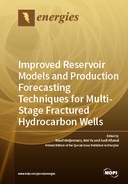Explore

Improved Reservoir Models and Production Forecasting Techniques for Multi-Stage Fractured Hydrocarbon Wells
Ruud Weijermars, Wei Yu, Aadi Khanal
2019
0 Ungluers have
Faved this Work
Login to Fave
The massive increase in energy demand and the related rapid development of unconventional reservoirs has opened up exciting new energy supply opportunities along with new, seemingly intractable engineering and research challenges. The energy industry has primarily depended on a heuristic approach—rather than a systematic approach—to optimize and tackle the various challenges when developing new and improving the performance of existing unconventional reservoirs. Industry needs accurate estimations of well production performance and of the cumulative estimated ultimate reserves, accounting for uncertainty. This Special Issue presents 10 original and high-quality research articles related to the modeling of unconventional reservoirs, which showcase advanced methods for fractured reservoir simulation, and improved production forecasting techniques.
This book is included in DOAB.
Why read this book? Have your say.
You must be logged in to comment.
Rights Information
Are you the author or publisher of this work? If so, you can claim it as yours by registering as an Unglue.it rights holder.Downloads
This work has been downloaded 320 times via unglue.it ebook links.
- 241 - pdf (CC BY-NC-ND) at Unglue.it.
Keywords
- (re)fracturing
- Austin Chalk
- bottomhole pressure
- bubble point pressure
- Changning shale gas
- cluster efficiency
- Cyclic CH4 injection
- discrete fracture model
- drained rock volume
- Eagle Ford shale
- EDFM
- embedded discrete fracture model
- enhanced oil recovery
- enhanced permeability
- EUR
- flow modeling
- flow models
- fracture modeling
- fracture porosity
- fracture properties
- fractured reservoir
- hydraulic fracture closure
- hydraulic fractures
- hydraulic fracturing
- hydraulic fracturing test site
- infill wells
- line detection
- low-permeability reservoir
- microseismic
- midland basin
- mimetic finite difference method
- molecular diffusion
- multiple fracture propagation
- nanopore confinement
- natural fractures
- naturally fractured reservoirs
- particle paths
- perforating number
- pore network
- pressure communication
- pressure depletion
- production history matching
- production uplifts
- semi-analytical model
- sensitivity analysis
- shale gas
- staged fracturing horizontal well
- stimulated reservoir volume
- time of flight
- well interference
- well spacing
- wolfcamp formation
Links
DOI: 10.3390/books978-3-03921-893-6Editions


